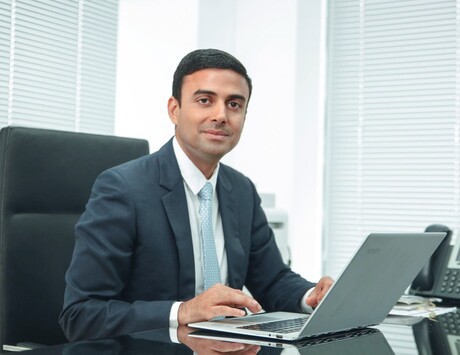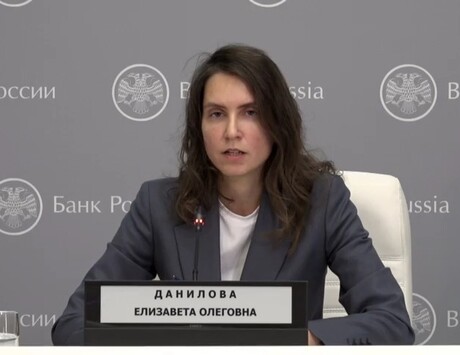We are midway through the first course at Moscow’s best Italian restaurant when I notice out of the corner of my eye that something on my guest’s plate is moving.
Sure enough, at second glance, it turns out that one of the fresh scampi that has just been served to Alexander Lebedev, the billionaire Moscow banker and London newspaperman sitting across from me and waxing eloquent about the Russian potato farming industry, is very, very fresh. In fact, it is trying to get off his plate. Lebedev blocks it with his table knife.
He doesn’t mention it and, since I am a well brought-up US Midwesterner – conditioned to make polite conversation even if my lunch partner gets hit by a falling anvil – neither do I. Instead I focus on the Russian potato industry. Lebedev spears and eats the scampi.
In my defence, I should add that he chose the restaurant. We are lunching at Bistrot, where a meal costs about as much as a round-trip ticket to Rome. A block from the Moscow river’s Savvinskaya embankment and right around the corner from Soho Rooms, which is sort of the Death Star of Moscow nightclubs, Bistrot is run by uprooted Italians from the town of Forte dei Marmi, a Russianised enclave on the Tuscan coast.
“One [Boris] Berezovsky moves to the south of France and a hundred Berezovskys follow him,” Lebedev says, describing the herd instinct of the Russian leisure class, and referring to the notorious London-based tycoon. As he tells it, some executives of a Russian state bank bought villas in Forte dei Marmi a few years ago, and a throng followed them. “Finally, someone seduced the chef of the best restaurant there to come back and set up in here,” he says.
Lebedev, 52, has arrived with his usual breezy confidence and flawless English. He’s wearing a pair of black jeans, a grey waistcoat, and very un-oligarch-like canvas high tops. His close-cropped white hair and a set of incredibly angular designer glasses give him a slightly aerodynamic look.
He has also come with a printout. In April the FT published a history of “Lunch with the FT”, and Lebedev has zeroed in on a list of the most expensive lunches (the rule is that the FT always pays). At number nine is his son Evgeny, who presides over the Lebedev media empire in the UK, which includes the Evening Standard and the Independent newspapers. In 2009 Evgeny racked up an impressive £196.13 at London’s Sake No Hana. “Let’s see if I can beat Evgeny,” says Lebedev, unrolling his napkin with a flourish. I take a look at the menu. This is not going to be hard.
. . .
In the UK, Lebedev is probably best known for being Britain’s second-most notorious newspaper proprietor, due to his former career as a KGB officer. In Russia, however, he is mainly known for punching a real estate mogul named Sergei Polonsky in the face on national TV last year. The scuffle, in which Lebedev knocked Polonsky off the podium with two quick boxing jabs, had been preceded by two hours of Polonsky insulting Lebedev, who as a parliamentary deputy in 2007 had investigated Polonsky for corruption. Lebedev insists Polonsky threatened him, saying, “I feel like hitting someone in the face.”
“Why wait to take the first blow?” Lebedev tweeted afterwards. “I neutralised him.”
Television punch-ups are not that uncommon in Russia. A web video, “The Greatest TV Fights of 2011”, published on the website of the Moscow tabloid Komsomolskaya Pravda, actually puts Lebedev vs Polonsky at a respectable number five, while on the YouTube clip of the incident, one can clearly hear the show's host shouting, “Gentlemen! Oh not again! Do you know how many fights there have been in this studio?”
But few of these punch-ups have received the legal scrutiny that Lebedev’s has. After Vladimir Putin – then prime minister, now president – publicly called Lebedev’s behaviour “hooliganism”, a team of eight investigators from the prosecutor’s office showed up and have spent 10 months investigating the incident, so far without making charges. “They still haven’t found the body,” Lebedev quips.
Lebedev says, and it is hard to dispute, that he is singled out for such treatment by the authorities. This year, Russia’s Central Bank sent 140 inspectors, for four and a half months, to run a thorough check on Lebedev’s National Reserve Bank. In 2010, NRB was raided by police commandos as part of an investigation into asset-stripping in which Lebedev was subsequently cleared. He believes, credibly, that the attention he gets is due to his funding an opposition-oriented newspaper that has made a speciality of ferreting out corruption in the Kremlin elite. “Of course it’s because I own Novaya Gazeta,” he says.
According to Lebedev, who says he could go to jail for four years on charges of hooliganism and battery, the Polonsky incident is one more “hook”: “just like they have me on so many other hooks”.
Luckily, the only interference at lunch is from the waiter. What’s good here? I ask. Lebedev presses the scampi on me. “It’s very fresh, basically raw,” he says, with a twinkle in his eye. Thankfully, I go for the prosciutto appetiser instead. For the second course, “I’d recommend the goat”, he says. I’ve never imagined paying around £60 for goat before but, hey, we’re trying to beat Evgeny’s tab, and this will put us over the top. Lebedev orders the octopus salad, along with the scampi.
Lebedev looks a bit tired when I ask him about his career in the KGB. He has no doubt had to talk about this ad nauseam, at virtually every London cocktail party he has been to (in Moscow, people generally don’t ask). “The job was actually reading everything and then informing, the same as the actual diplomats do,” he says.
He joined the KGB in 1982, having studied international economics, and spent the first five years at the KGB academy and then as a relatively minor translator of English because, he believes, of a joke he once told in his kitchen about Lenin (too long to recount here), which is still, apparently, in his file.
It was only in 1988 that he was posted to London under diplomatic cover. It was “a fairly boring desk job”, he insists. So you weren’t going around putting radioactive isotopes in people’s sushi and things like that?
“Well, that wasn’t really a tradition,” he says deadpan. “All operations like that were cancelled under Khrushchev and, to my knowledge, they didn’t do anything like that since the 1950s.”
I’m not entirely convinced by this. Neither was Rupert Murdoch, who, following the attempted assassination of Russian businessman German Gorbuntsov in London in March, tweeted: “Another Russian shot down in London. Wonder what ex-KGB boss Lebedev could tell his paper [the] Independent?”
Lebedev answered: “I didn’t know you could use Twitter.”
I have to take Lebedev’s side on this one, believing that anyone who comes to lunch in hipster jeans and canvas Chuck Taylor All Stars is unlikely to commit murder.
So you never recruited an agent? “Never. Not my role. I would say 99 per cent of everything I reported was based on open sources.” He adds, clearly not for my benefit, that he began every day by reading the Financial Times.
In the days of the USSR, people generally joined the KGB in order to get ahead. Coincidentally, on the day we meet, there is a piece in a Moscow newspaper about Mikhail Dmitirev, a former boss of Lebedev’s who once headed the analytical department of the KGB’s first directorate, and who has just been made chairman of the board of Almaz-Antey, a state company that produces anti-aircraft missiles. People with Lebedev’s background have done exceedingly well in post-communist Russia.
In 1992 Lebedev left the KGB and, in short order, seems to have acquired a gigantic amount of money. The story, as he tells it, is actually rather dull. It has something to do with buying distressed debt and Gazprom receivables, and then selling them, and then losing all his money in the rouble crash of 1998, and then making it back again. According to Forbes, his current fortune is $3.5bn.
. . .
The philosopher Isaiah Berlin once separated intellectuals into “hedgehogs” and “foxes” – “the fox knows many things, but the hedgehog knows one big thing”, said Berlin, quoting Greek poet Archilochus. This dichotomy also applies to modern-day Russian oligarchs. Most are hedgehogs, as monomaniacal as they come – a lunch with any of them might consist of a three-hour discussion of steel alloys.
Lebedev is a fox, an almost hyper-kinetic conversationalist who flits between subjects with vertiginous ease. He might start off on world politics, move on to the opacity of the Latvian banking system, then the airline industry – he owns 15 per cent of Russian airline Aeroflot – and then his potato farm in Tula province – apparently the largest in Europe.
Airlines and Russian agriculture are, of course, not the only distressed industry he has taken an interest in. According to testimony given by Evgeny at the Leveson inquiry in April, Lebedev has sunk £75m into the Independent and the Evening Standard.
When he bought the Evening Standard in 2009, his KGB past was widely reported in the British press. There are whispers that he is a front for some KGB plot to infiltrate western institutions; that, despite his opposition politics, he is actually the Kremlin’s man. People constantly suspect he is up to something. Though I can’t help thinking that if you were a former KGB officer trying to launder your reputation, would it really make sense to become a London newspaper proprietor?
So, I ask, how often do you meet David Cameron? Evgeny testified at Leveson that he had met Cameron four times but, for his part, Lebedev says he has only seen him at a British embassy reception when Cameron came to Moscow in 2011. “As an investor in a distressed industry, I believe it’s normal to have some contacts with politicians,” he says.
He seems a little too outspoken for the classic double-bluff role sometimes ascribed to him. When the talk turns to Russia’s nascent opposition movement, he goes on an extended diatribe about corruption. “We have received 2 trillion in extra revenues from higher export prices. One third was pocketed by 200 individuals. One third was spent on improving wages and salaries in the budget sector but they were eaten up by rising prices, and one third was thrown out the window for, say, the [2014] Olympics.
“So,” he goes on, “stop boasting to yourself and lying to us and to yourself about what a great job you’ve done in 12 years.” The name “Putin” is never used, but doesn’t need to be.
He has also agreed to support Alexei Navalny, an anti-corruption blogger-turned opposition leader. In June he helped Navalny get elected to Aeroflot’s board of directors. “People think I’m playing some political games,” he says. “In fact, I’m shooting myself in the foot. I’m always in trouble, trying to convince the top political echelons I’m not an enemy,” he says.
It is hard to believe his financing of Novaya Gazeta is anything other than a headache in Putin’s Russia. It is certainly not profitable. I ask him why he likes newspapers so much. “Well, I think it’s culturally so important. This country was just destroying culture for 90 years, destroying [Boris] Pasternak, [Osip] Mandelstam and [Anna] Akhmatova and that brought a huge tragedy to the people, who are recovering from it, but it takes generations. Newspapers are a centre of public culture,” he says. “We can’t give in to extortion. Otherwise we’ll just have a repeat of the last (Soviet) era.”
Speaking of extortion, the bill finally comes: Rbs13,085, or £261. We have beaten Evgeny, and landed squarely in between British cyclist David Millar and Finnish politician Martti Ahtisaari at number four on the list of expensive lunches. I also have a new-found culinary interest in goat, which incidentally, was delicious. But for appetiser, I’ll stick to prosciutto.



